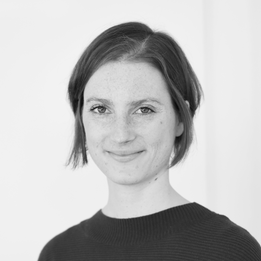Doctorate Dissertations
Johanna Schindler

Portrait
Johanna Schindler was trained as a cultural scholar and arts manager (Halle / Germany, Paris, and Friedrichshafen / Germany) and wrote her doctoral thesis on artistic research. She has worked as a curatorial assistant at Kunstmuseum Liechtenstein, as a manager of the International Association of Curators of Contemporary Art, as a research fellow at Zeppelin University, Germany, and as a researcher and coordinator at Haus der Kulturen der Welt, Berlin. Since 2019, she is the managing editor of the Journal of Cultural Management and Cultural Policy, a reviewer for the Journal for Artistic Research, and a freelance translator, editor, and project adviser in the arts and cultural fields.
Doctoral Thesis
“Subjectivity and Synchrony in Artistic Research – Ethnographic Insights”
Artistic research has become an established mode of inquiry and knowledge production in many fields. This study analyses the emerging research dynamics and collaborative practices of two artistic research projects in the fields of digital musical instrument design and responsive environments. How are individual research modes organised? Which forms of knowledge are at stake? What sort of influence do institutional settings, spatial arrangements, and boundary objects have on the emerging research dynamics? And which criteria can be found to evaluate artistic research projects? While numerous publications offer important insights into methods and practices underpinning artistic research, the analyses of these projects are seldom founded on an in-depth theoretical approach. Therefore, Johanna Schindler carried out one of the first long-term ethnographic studies in this field to analyse the above-mentioned questions.
Over a period of one year, she accompanied two artistic research projects three times for three weeks each. These projects were located in Berlin (Germany) and Basel (Switzerland). During different project phases, she carried out participant observation, performed qualitative interviews, and took field notes as well as pictures. The data and material collected was translated into two detailed case descriptions. Afterward, the combination of boundary objects (Star & Griesemer, 1989), affordance (Gibson, 1986), and affect theory (Seyfert, 2012) enabled an examination of the research settings in their entirety—comprising, for example, spaces, institutional contexts, objects, material, and atmospheres—while simultaneously accounting for the researchers’ subjective moods, abilities, disciplinary backgrounds, interests, behavioural patterns, time management and research practices. The notions of attunement and synchrony (Koole & Tschacher, 2016; Wheatley, Kang, Parkinson, & Looser, 2012) were then used to examine how the researchers integrated different time-management strategies and research logics into their research collaborations.
A key finding of this analysis is that current criteria to evaluate artistic research projects (research output and results) need to be reconsidered. Rather than focusing on quantitative indicators such as the number of publications, conference presentations, or supervised PhD students, attunement and synchrony might be more fruitful to examine whether researchers were able to establish what the author calls synchronous research dynamics. With this term, she points to the fact that transdisciplinary research settings generally, and artistic research settings more specifically, require constant negotiation of subjective aesthetic, material, or organisational preferences, individual work patterns, disciplinary backgrounds, methods, competences, and research logics. These differences can both contribute to and inhibit the development of joint research endeavours. Johanna Schindler concludes that rather than muting these differences between disciplinary approaches, each researcher’s individual background, interests, competences, and preferences could be productively integrated into synchronous research dynamics—contributing to a transdisciplinary environment which enables the pursuit of both joint and individual research endeavours. In the final chapter, she suggests concrete measurements that can be utilised to adapt the research environments, funding structures, and evaluation criteria of artistic research projects to the specific needs of this emerging field.
The publication can be ordered via transcript.
Public Lectures
- Design and Development of Boundary Objects in Artistic Research
Guest lecture, 12/2019, Milieux, Concordia University Montréal - Espaces, mouvements, et attention: Les affordances d’un musée
Keynote on behalf of Martin Tröndle, 12/2019, SOFPEL annual session, Musée des Beaux Arts Montréal - Subjectivity and Synchrony in Artistic Research. Ethnographic Insights
Guest lecture, 11/2018, Hybrid Plattform, Berlin - Boundary Objects in Artistic Research. Developing Synchrony between individual practices
Public lecture, 5/2018, Annual meeting of the International Association of Curators of Contemporary Art, Danzig - Boundary Objects in Artistic Research
Public lecture, 1/2018, Symposium on Limits, Boundaries and Edges, Transart Institute / Else Foundation, Mexico D. F. - The Role of Boundary Objects in Artistic Research. An Analysis of their Epistemic Potential and Structuring Function in Research Environment
Public lecture, 8/2016, 4S/EASST annual meeting (Track: Artistic Research), Barcelona
Monographs
- Tröndle, Martin / Schindler, Johanna (forthcoming): Places of Excellence. How graduate programs build their reputation. Wiesbaden: Springer VS.
- Schindler, Johanna (2018): Subjectivity and Synchrony in Artistic Research. Ethnographic Insights. Bielefeld: transcript.
Book Chapters
- Schindler, Johanna (2019): Negotiation, Translation, Synchronization. The Role of Boundary Objects in Artistic Research, in: Borgdorff, Henk / Peters, Peter / Pinch, Trevor (Eds.): Dialogues Between Artistic Research and Science and Technology Studies, New York: Routledge, pp. 103–116.
- Schindler, Johanna / Hinrichsen, Amelie (2017): Movement Meets Material – An Improvisational Approach to Design, in: Bovermann, Till et al. (Eds.): Musical Instruments in the 21st Century. Identities, Configurations, Practices, Wiesbaden, Springer, pp. 97–126.
Peer Reviewed Journal Contributions
- Buck, Christina / Hofhues, Sandra / Schindler, Johanna (2015): Künstlerische Forschung unter Bildungsperspektive: individualisierte Studienprogramme?, Zeitschrift für Hochschulentwicklung 10 (1): pp. 53–77. Link to publication
- Schindler, Johanna (2015): Expertise and Tacit Knowledge in Artistic and Design Processes: Results of an Ethnographic Study, Journal of Research Practice 11 (2). Link to publication

